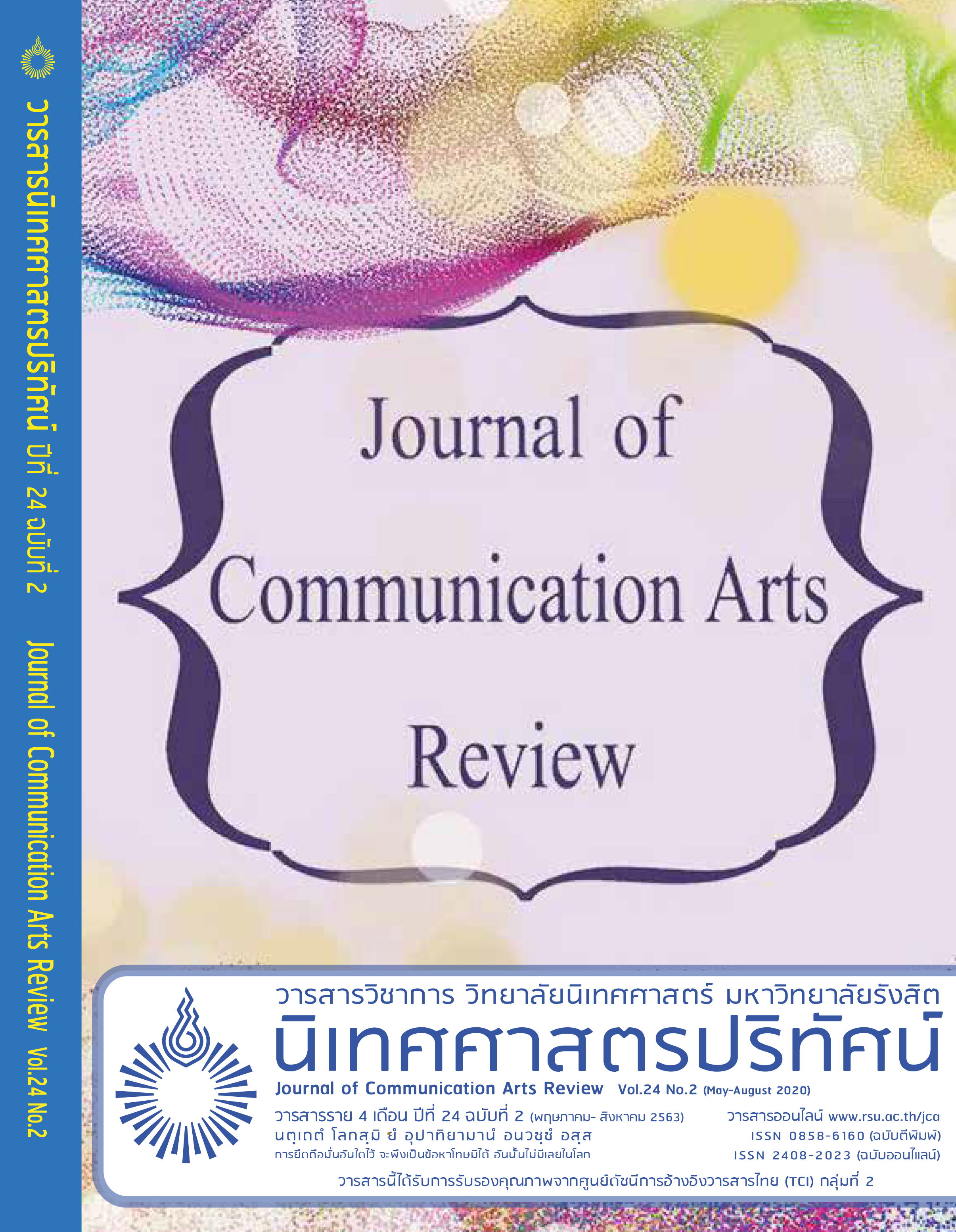ระบบการสื่อสารทางการเงินด้วยแนวคิดเชิงเกม เพื่อส่งเสริมความตั้งมั่นในเป้าหมายของนักลงทุนรายย่อย
คำสำคัญ:
การสื่อสารทางการเงิน, แนวคิดเชิงเกม, นักลงทุนรายย่อย, ความตั้งมั่นในการลงทุนบทคัดย่อ
งานวิจัยชิ้นนี้มีจุดประสงค์เพื่อตรวจสอบแนวทางการเสริมสร้างความตั้งมั่นในการลงทุนผ่านแนวคิดเชิงเกมในบริบทกิจกรรมการลงทุนออนไลน์ เพื่ออธิบายถึงปัจจัยท่ีก่อให้เกิดแรงจูงใจในการเรียนรู้และพัฒนา ตนเองของนักลงทุนรายย่อย ผ่านระบบการสื่อสารทางการเงินด้วยแนวคิดเชิงเกม (Gamified Financial Communication System) ท่ีได้รับการพัฒนาและนำไปใช้จริงในกิจกรรมการลงทุนออนไลน์ โดยใช้แบบ จำลองสมการโครงสร้างในการวิจัยและเก็บข้อมูลจากกลุ่มนักลงทุน 247 คน ที่ใช้งานระบบ GFCS ผ่าน แบบสอบถามเพื่อวัดผลตัวแปรอันประกอบไปด้วย การตอบสนอง แนวคิดเชิงเกม แรงจูงใจในการเรียนรู้ การประมวลผลข้อมูลการหลีกเลี่ยงความเสี่ยง และความตั้งมั่นในการลงทุนผลการวิจัยจากการวิเคราะห์สมการ โครงสร้างและความสัมพันธ์เชิงเส้นของตัวแปรทั้ง 6 ได้สนับสนุนสมมติฐานทั้ง 14 สมมติฐาน โดยพบว่าแรงจูงใจในการเรียนรู้ (LearningMotivation) มีความสำคัญต่อความตั้งมั่นในการลงทนุ (InvestmentIntention) มากที่สุด รองลงมาคือ แรงกระตุ้นเชิงเกม (Gamification) และแรงกระตุ้นทางการตอบสนอง (Interactivity) ผลที่ได้เป็นการพิสูจน์ว่าออกแบบการสื่อสารที่ประยุกต์ใช้แนวคิดเชิงเกม จะส่งผลต่อการเรียนรู้และเสริมสร้าง ความตั้งมั่นในการลงทุนของนักลงทุนรายย่อยเป็นอย่างดี ในท้ายที่สุดผู้วิจัยได้เสนอ 3 ข้อเสนอแนะสำหรับ ผู้ให้บริการทางการเงินนำได้ประยุกต์ใช้เป็นกลยุทธ์และพัฒนาระบบการสื่อสารทางการเงิน
เอกสารอ้างอิง
สถาบันวิจัยเพื่อตลาดทุน. (2554). พัฒนาการตลาดหลักทรัพย์แห่งประเทศไทย 36 ปี. กรุงเทพมหานคร. ตลาดหลักทรัพย์แห่งประเทศไทย. [Capital Market Research Institute (2010). Stock Exchange of Thailand Development 36 Years. Bangkok : The Stock Exchange of Thailand.]
สถาบันวิจัยและให้คำปรึกษาแห่งมหาวิทยาลัยธรรมศาสตร์ (2559): ผลการศึกษาพฤติกรรมผู้มีศักยภาพลงทุนในตลาดหลักทรัพย์และนักลงทุนบุคคลในต่างจังหวัด. กรุงเทพ : ตลาดหลักทรัพย์แห่ง ประเทศไทย. [Thammasat University Research and Consultancy Institute (2014). Results of the study of potential behaviors Invest in the stock market and private investors in the provinces. Bangkok : The Stock Exchange of Thailand.]
Arnab, Sylvester; Brown, Katherine; Clarke, Samantha; Dunwell, Ian; Lim, Theodore; Suttie, Neil et al. (2013): “The development approach of a pedagogically-driven serious game to support Relationship and Sex Education (RSE) within a classroom setting.” In Computers & Education 69, pp. 15–30. DOI: 10.1016/j.compedu.2013.06.013.
C. Girard; Jean Écalle; Annie Magnan (2013): “Serious games as new educational tools: how effective are they? A meta-analysis of recent studies.” In undefined. DOI: 10.1111/j. 1365-2729.2012.00489.xUR.
Henseler, H. Wang (Eds.) (Eds.): Handbook of Partial Least Squares: Concepts, Methods and Applications in Marketing and Related Fields. Berlin: Springer, pp. 655–690.
Coyne, Richard (2003): “Mindless repetition: Learning from computer games.” In Design Studies 24 (3), pp. 199–212. DOI: 10.1016/S0142-694X(02)00052-2.
Domde-Marcos, Luis; Domínguez, Adrián; Saenz-de-Navarrete, Joseba; Pagés, Carmen (2014): “An Empirical Study Comparing Gamification and Social Networking on E-Learning.” In Computers & Education 75, pp. 82–91. DOI: 10.1016/j.compedu.2014.01.012.
Domínguez, Adrián; Domde-Marcos, Luis; Fernández-Sanz, Luis; Pagés, Carmen; Mart’inez- Herráiz, José-Javier (2013) “Gamifying Learning Experiences: Practical Implications and Outcomes.” In Computers & Education 63, pp. 380–392. DOI: 10.1016/j.compedu.2012.12.020.
GOMEZ-MEJIA, LUIS R.; BALKIN, DAVID B. (1989): Effectiveness of individual and aggregate compensation strategies. In Industrial Relations: A Journal of Economy and Society 28 (3), pp. 431–445.
Grinblatt, Mark; Keloharju, Matti (2009) “Sensation Seeking, Overconfidence, and Trading Activity.” In The Journal of Finance 64, pp. 549–578.
Hamari, Juho; Koivisto, Jonna (2015): “Why Do People Use Gamification Services.” In International Journal of Information Management 35, pp. 419–431. DOI: 10.1016/j.ijinfomgt.2015.04.006.
Hamari, Juho; Koivisto, Jonna; Sarsa, Harri (2014): “Does Gamification Work? A Literature Review of Empirical Studies on Gamification.” In : IEEE Computer Society, pp. 3025–3034.
Harrison, Tina (2003) “Editorial: Understanding the behaviour of financial services consumers: A research agenda.” In Journal of Financial Services Marketing 8 (1), pp. 6–10. DOI: 10.1057/palgrave.fsm.4770102.
Karoulis, Athanasis; Demetriadis, Savvas (2005) The motivational factor in educational games. Interaction between learner’s internal and external representations in multimedia environments. D21-02-01-F: Research Report.
Keller, John M. (1987): “Development and use of the ARCS model of instructional design.” In Journal of Instructional Development 10 (3), pp. 2–10. DOI: 10.1007/BF02905780.
Keller, John M. (2010): Motivational Design for Learning and Performance: The ARCS Model Approach. New York, London: Springer.
Krishnan, Ranjani; Booker, Donna M. (2002): “Investors’ Use of Analysts’ Recommendations.” In Behavioral Research in Accounting 14 (1), pp. 129–156. DOI: 10.2308/bria.2002.14.1.129.
Lee, Joey; Hammer, Jessica (2011): “Gamification in Education: What, How, Why Bother?” In Academic Exchange Quarterly 15, pp. 1–5.
Liu, Yuping (2003): “Developing a Scale to Measure the Interactivity of Websites.” In Journal of advertising research 43, pp. 207–216.
Mayfield, Cliff; Perdue, Grady; Wooten, Kevin (2008): “Investment management and personality type.” In Financial services review 17.
Piaget, Jean (1962): Play, dreams and imitation in childhood. London: Routledge & K. Paul.
Prensky, Marc. (2001): Digital game-based learning. New York: McGraw-Hill.
Robbins, Stephen P. (2005): Organizational behavior. 11th ed. New Delhi: Prentice-Hall of India.
Sandberg, Jacobijn; Maris, Marinus; Geus, Kaspar de (2011): “Mobile English learning: An evidence-based study with fifth graders.” In Computers & Education 57 (1), pp. 1334–1347. DOI: 10.1016/j.compedu.2011.01.015.
Wu, W-H.; Hsiao, H-C.; Wu, P-L.; Lin, C-H.; Huang, S-H. (2012): “Investigating the learning-theory foundations of game-based learning: a meta-analysis.” In Journal of Computer Assisted Learning 28 (3), pp. 265–279. DOI: 10.1111/j.1365-2729.2011.00437.x.


